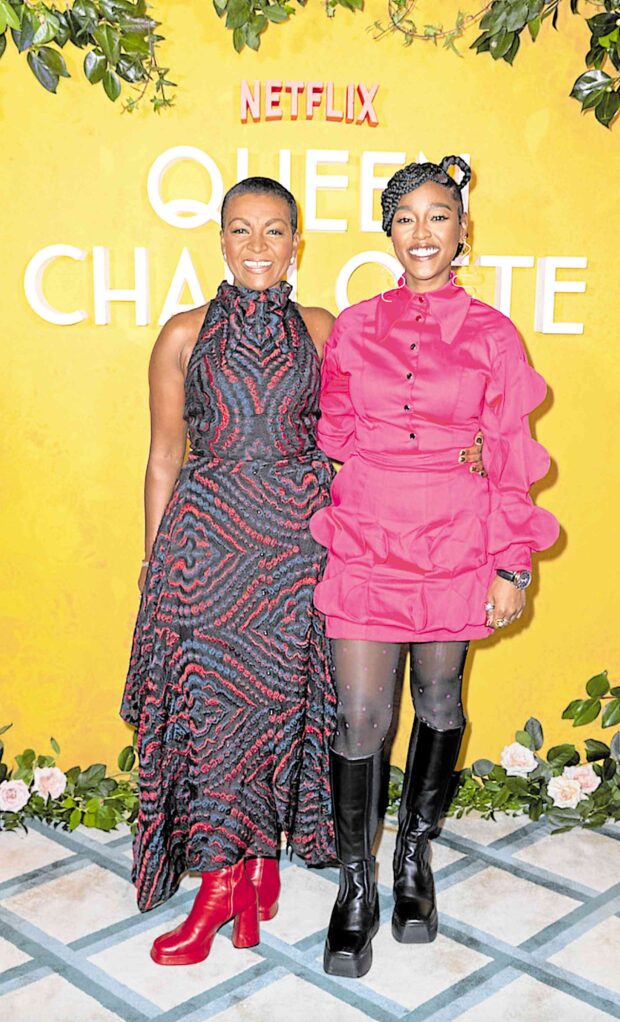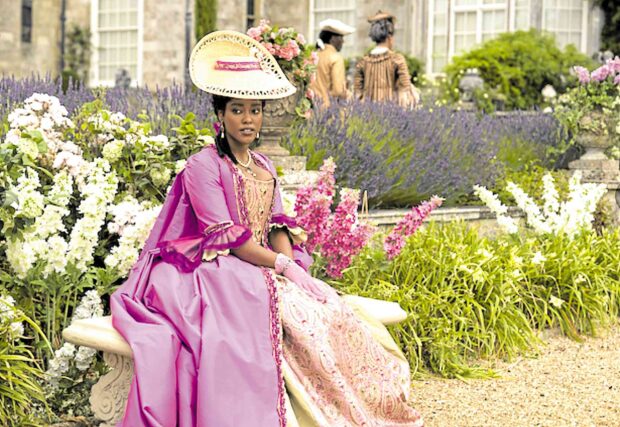Why Arsema Thomas refuses to let her character feel like a victim
There are great reasons why Netflix’s “Bridgerton” prequel, “Queen Charlotte,” is getting superlative feedback from viewers and critics alike (it has a 93-percent approval rating on Rotten Tomatoes)—and one of them is its young and exciting cast.
Leading “Queen Charlotte’s” thespic charge are India Amarteifio as the irrepressible teenage queen, the dashing Corey Mylchreest as “mad” King George III, and the scenery-chewing newcomer Arsema Thomas as Agatha, Lady Danbury, Queen Charlotte’s lady-in waiting.
Of course, the series—admittedly a “work of fiction inspired by fact”—focuses on Charlotte’s rise to power and her “unconventional” romance with her troubled groom, but Arsema manages to hold her own, acquits herself with a can-do vibe, and takes the shine off the show’s striking leads every time the spotlight is on her character.
Lady Danbury’s situation may not be ideal—when she was a child, she was betrothed to a kind but much older man, who treats her like a sex toy at bedtime—but she refuses to see herself as a victim. In fact, she uses her situation like a bargaining chip to protect herself and her family’s status in society.
The 28-year-old Yale-educated, Rada (Royal Academy of Dramatic Art)- and Lamda (London Academy of Music and Dramatic Art)-trained American actress who plays her was born in Atlanta to a Nigerian father and an Ethiopian mother, both diplomats. Because of that, Arsema speaks a lot of languages and had lived in countries like Uganda, Tanzania, India, Benin, Togo, Kenya and the Comoros.
Article continues after this advertisementCohesive
When Arsema spoke to the Asian press in a recent roundtable chat, she was asked what the difficulties were in bringing young Lady Danbury to life (the older Agatha is played by Adjoa Andoh).
Article continues after this advertisementArsema recalled, “The challenge that I had with playing Agatha was that I’ve never really been put into a situation like hers. She doesn’t have the freedom to speak her mind, not even in her choice of clothing.
“And so, to be a woman in that situation and not be angry or not want to immediately fight back, but to be able to hold in all that pent-up emotion and have such control was a huge struggle for me.
“As an actor, we’re always reactive … we say what’s on our mind. But Lady Danbury is so thoughtful—she has a strategic way of observing the lay of the land and inserting herself into the most optimal position there is for her. So while it was difficult, there was also something that I took away from her, something that I now practice in my day-to-day life.”
Since the series follows two timelines, in which viewers are shown the formative years of the franchise’s older characters, we asked Arsema if she felt like her portrayal had to be in sync with that of Adjoa’s take on Lady Danbury.
“Maybe not in sync, but I think they had to be cohesive,” the actress explained. “I imagine that 40 years from now, I will be very different from the way that I am today. So there’s less a need to be the same and at least more similar in the journey we embark on.
Collaborative, easygoing
“That’s why Adjoa and I needed the same starting point. We both agreed where Agatha was born, what type of family she had, etc.—all of the small details that were not in the script, but could help inform the choices I make so that the decisions that Adjoa pursues would make sense.
“Because when you flip back and forth between scenes, they have to be on the same page and domain. It became a very collaborative and easygoing process, and Adjoa was so generous to share that with me.”
Excerpts from our Q&A with Arsema:
How did you get the role?
The process was very fast and very furious. I was told about the audition but, at the time, I didn’t know what it was for, so I didn’t even think that anything would happen. I went in and did my self-tape of a scene from Season 1 of “Bridgerton”… it was one of Penelope Featherington’s (Nicola Coughlan) scenes.
I have not seen “Bridgerton” then, so I tried my best to give them just me and hope that it was enough—and they liked it (laughs)! I kept hearing back from them until, in February last year, I went in for a chemistry read with India, then with Corey towards the end. It still feels like a dream.
“Queen Charlotte: A Bridgerton Story” highlights various topics on womanhood, racial discrimination, even mental health. How does it feel playing a strong character like Lady Danbury?
It’s extremely validating. She’s similar to a lot of the women in my life who I feel have never had the chance to be shown in such a light. Like so many women in our lives, she tends to be in the background. So there’s something refreshing and revolutionary about moving her into the spotlight and giving her the laurels that she deserves.
It also felt very personal and very moving. It’s one of the reasons I wanted to pursue acting… so I could expose the inequality of the stories that we tell, and also so that no girl would ever feel the way that I felt growing up watching TV, assuming that my story doesn’t matter because I’m not being depicted in them. It made me feel like I was doing something for the crucial conversations we’re having on a much larger scale.
How connected are you to your Nigerian roots? Do you take any inspiration from any older Nigerian royalty to add a unique spin to your character?
My father was from Lagos (in Nigeria). I grew up in Benin, and went to boarding school in Togo. We would play soccer matches against some of the schools in Ghana. There were a lot of Nigerian elements I brought in for this character, because of the West African calling that she has. I even created waist beads, with colors specifically chosen for her, which I wore throughout filming to keep myself grounded.
Lady Danbury is a West African woman, and playing her in such an English setting actually made me miss Nigeria so much more because she misses it, too. She feels away from home in a very similar way.
What was the most memorable scene for you in this whole series?
The most memorable scene for me was my first showdown with Princess Augusta (Michelle Fairley), King George’s mother. In it, I was given this speech that I felt so honored to deliver, because so seldom do those words get spoken … this amazing rebuttal during a very heated debate between two strong and independent women.
It felt like fire, and every bit of your senses are tingling! Like, you hear it, feel it, smell it, see it. And to act opposite Michelle Fairley from “Game of Thrones”… you better be on your best behavior! You can see how much I love the scene with the way I’m reacting now (laughs). And I would gladly do that scene over and over again.
You turn in a crackerjack portrayal of a woman who refuses to only see herself as a victim. In fact, the young Lady Danbury makes her not-so-ideal situation work in her favor. How did you arrive at this complex balancing act?
That’s a good question. When I was thinking about how to engage in this space of conflict, I was so overwhelmed because I realized that while this show takes place in the Georgian era, that same amount of conflict continues to exist now in many of us … that feeling of being unable to speak out of fear or because of the way society views us.
But having this fire, this internal understanding of right and wrong, this need to create change, I feel like that conflict resides in me. I’ve had that conflict all my life. Growing up around sub-Saharan Africa, I was exposed to a lot of what I found to be wrong, and feeling like bureaucracy and politics were holding us back from creating change.
It’s the same thing that Agatha is feeling, just in a different degree. So, there’s something “cosmic” when you, as an actor, get to address the conflicts that are also affecting you internally as the person.
And I was lucky enough to be able to draw upon that in a very safe environment. Moreover, when the writing is as good as it is in this show, it also feels like, “Oh, now I have the words to express what I actually feel!

